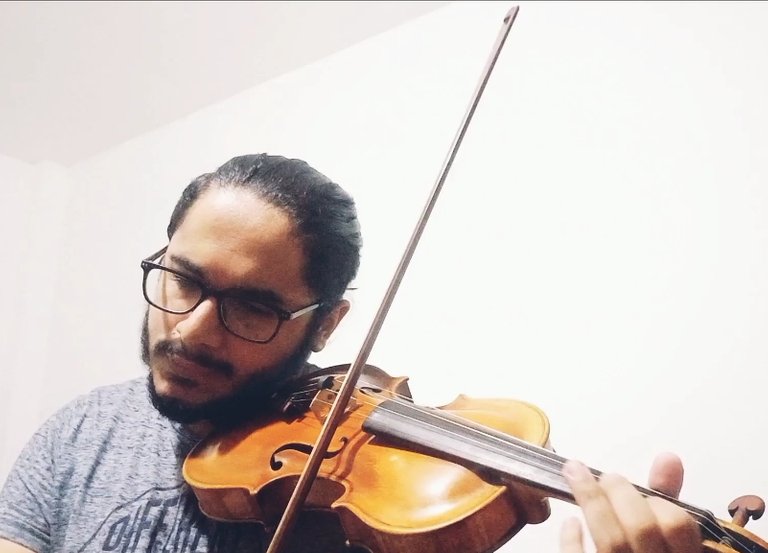Música para relatar vidas / Music to tell lives

Hola nuevamente queridos y apreciados amigos, espero estén de lo mejor
Cómo segundo y último post de hoy quiero hablarles de una característica que tienen las artes en general, la cuál es usada por quienes la crean para relatar, mostrar y hasta desahogar, siendo así una forma de relatar tus vidas mismas,
Las artes desde un comienzo fueron vistas cómo una forma de expresividad que va más allá del humano mismo, algo que se hace y se crea desde la mente hasta las manos. Desde la inspiración, idea y luego a lo físico.
Ésta forma de expresarse de usó de muchas cosas, y es por ello que específicamente en la música muchos compositores la usaron para mostrar un poco de sus propias vidas, lo cuál mucho tiempo después nos ayudaría a entenderlos muchos más, a ellos mismos cómo personas humanas, cómo compositores y por supuesto a sus obras.
Un ejemplo que suelo usar siempre es que si un compositor pasa toda una infancia escuchando folclore, ya cuándo éste comience a crear, tendrá justamente cosas y colores de ese folclore que escuchó. Pudiendo ser algo muy oculto o muy notorio, pero que siempre está,
En el caso de Tchaikovsky sabemos que pasó una vida muy difícil con su homosexualidad que en ese entonces era prácticamente un delito, y también con su lucha con la depresión, y todo ello lo va a demostrar en absolutamente toda su música, sin ningún tipo de excepción.
En el fragmento que escucharemos vamos a notar cómo Tchaikovsky comienza muy tranquilo, pero en una tonalidad menor, comenzando a desesperarse mientras va pasando la melodía. Justo cómo lo hacía cuando él aspiraba mucho más, pero que la depresión no lo ayudaba.
Ésta ansiedad comienza a explotar cuando el compositor usa un cromatismo, una especie de sonidos sucesivos que van de medio tono, dando así una especie de sensación de querer alcanzar algo... En éste caso es alcanzar la serenidad, la tranquilidad, la paz, y por supuesto el amor. Luego finalmente lo consigue cayendo así a una melodía climática que va calmandose, pero con excesivo cansancio.
Es realmente complejo explicar fragmentos cortos, pero es sin duda alguna una forma muy efectiva de entender la música en general,
Así que sin más que agregar por hoy espero les guste ésta pequeña melodía de su quinta sinfonía, ¡Abrazos!
/

Hello again dear and appreciated friends, I hope you are doing well
As the second and last post today I want to talk to you about a characteristic that the arts in general have, which is used by those who create it to relate, show and even vent, thus being a way of recounting your own lives,
The arts from the beginning were seen as a form of expressiveness that goes beyond the human itself, something that is made and created from the mind to the hands. From inspiration, idea and then to the physical.
This way of expressing himself used many things, and that is why, specifically in music, many composers used it to show a bit of their own lives, which much later would help us understand them much more, themselves as human beings. , how composers and of course their works.
An example that I always use is that if a composer spends a whole childhood listening to folklore, and when he begins to create, he will have precisely the things and colors of that folklore that he heard. Being able to be something very hidden or very notorious, but that is always there,
In the case of Tchaikovsky, we know that he had a very difficult life with his homosexuality, which at that time was practically a crime, and also with his struggle with depression, and all of this is going to be demonstrated in absolutely all his music, without any type of exception.
In the fragment that we will listen to, we will notice how Tchaikovsky begins very calmly, but in a minor key, beginning to despair as he plays the melody. Just like he used to when he aspired so much more, but that depression wasn't helping him.
This anxiety begins to explode when the composer uses a chromaticism, a kind of successive sounds that go halftone, thus giving a kind of sensation of wanting to achieve something... In this case it is to achieve serenity, tranquility, peace, and of course love. Then he finally succeeds in falling like this to a climatic melody that calms down, but with excessive fatigue.
It is really complex to explain short fragments, but it is without a doubt a very effective way of understanding music in general,
So without further ado for today I hope you like this little melody from his fifth symphony, Hugs!
Congratulations @gregorior! You have completed the following achievement on the Hive blockchain and have been rewarded with new badge(s):
Your next target is to reach 40000 upvotes.
You can view your badges on your board and compare yourself to others in the Ranking
If you no longer want to receive notifications, reply to this comment with the word
STOPCheck out the last post from @hivebuzz:
Support the HiveBuzz project. Vote for our proposal!
Your post has been supported and upvoted from the Classical Music community (Subscribe at peakd) as it appears to be of interest to our community. We also support jazz and folk music posts!
If you enjoy our support of the #classical-music community, please consider a small upvote to help grow the support account!
You can find details about us below.
The classical music community at #classical-music, Peakd and Discord. Follow our community accounts @classical-music and @classical-radio or follow our curation trail (classical-radio) at Hive Vote!